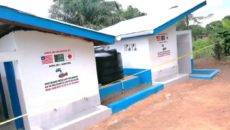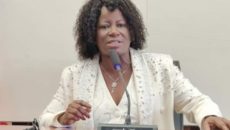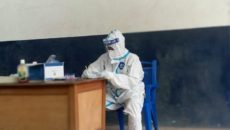WASHINGTON, USA –The Board of Executive Directors of the World Bank has approved a new US$60 million International Development Association credit for the Liberian government to help continue to expand affordable electricity services to businesses and households in order to spur economic growth, create jobs, and reduce poverty
Since the end of the civil war, the Liberia Electricity Corporation has been working to provide electricity to the country in spite of the many challenges it faces occasioned by the destruction of its facilities.
The corporation’s infrastructures including substations were damaged during the civil upheaval in 1990.
Currently, LEC generates 22 megawatts that are being run on high-speed diesel plant, with approximately 30,000 customers connected to the grid.
There is still a need to boost the corporation’s infrastructure to provide affordable electricity to all Liberians. The LEC is the only company producing power in Liberia.

This hydroelectric plant was damaged during the civil crisis, Photo Credit: Charles Carr, MFDP
According to a World Bank dispatch from the United States, additional financing will support the ongoing Liberia Accelerated Electricity Expansion Project, which aims to advance Liberia’s National Agenda For Transformation to achieve a more prosperous and inclusive society.
The dispatch asserted that the initial financing for the LACEEP was approved by the Bank’s Board of Directors on May 30, 2013, adding “the original project was designed to focus on the most pressing issues of the government’s plans to expand electricity services in Liberia.”
The World Bank dispatch notes that the new funds will allow the LACEEP to connect another 36,000 households and businesses located in important areas of greater Monrovia and in Bomi and Grand Cape Mount counties, with commercial and industrial customers accounting for 16 percent of the new connections.
The dispatch quotes Inguna Dobraja, the World Bank Liberia Country Manager for Liberia, who stated that in order to improve people’s livelihoods and to cope with the impact of the Ebola crisis, it is essential that houses and businesses in Liberia have electricity.
“This new financing will build on the ongoing project to increase access to power in Liberia by connecting households as well as key economic and social service facilities to the national electricity grid,†said Dobraja.
The World Bank said the LACEEP would help the Liberian government in its efforts to stabilize and rebuild the country’s post-Ebola economy.
“Expanding access to electricity will be critical to address both short-term needs of health and education centers, water treatment plants, and other vital facilities, as well as to support the economic and social recovery of Liberia,† the World Bank executive directors added.
Clemencia Torres de Mästle, World Bank Task Team Leader for the LACEEP, said the new financing will allow the project to expand electricity services in Monrovia, Bomi and Grand Gape Mount counties.
“It will also help strengthen the commercial capacity of the Liberia Electricity Corporation, which is an important step towards greater financial viability for the utility company,†Torres de Mästle said.
The World Bank said, with the additional financing, the overall project will provide a total of 46,300 new customers in Liberia with access to electricity that does include the existing 30,000 the corporation has.
The World Bank’s International Development Association was established in 1960 and helps the world’s poorest countries by providing grants and low to zero-interest loans for projects and programs that boost economic growth, reduce poverty, and improve poor people’s lives.
The International Development Association is one of the largest sources of assistance for the world’s 77 poorest countries, 39 of which are in Africa.
Currently, the LEC is in transition from diesel plant to heavy fuel oil that will increase the corporation generation capacity from 22 megawatts to 48 megawatts.
Also, four high-speed diesel plants at the corporation’s Montserrado site are under construction. The Japan International Cooperation Agency is funding the 10 megawatts of heavy fuel oil plant.

One of four heavy fuel oil plant under construction at Mount Coffee by JICA, Photo Credit: Winston Bedell/LEC
The government of Liberia is also constructing another 18 megawatts plant while the World Bank is funding the construction of a 10 megawatts plan at Mount Coffee.

A government-funded 18 megawatts heavy fuel oil plant at Bushrod Island. Photo: Winston Bedell/LEC
Works on these plants were stalled during the outbreak of the deadly Ebola virus.
Despite the significant gains strides made by the LEC to provide electricity to Liberians, the corporation is overwhelmed with power theft.
Authorities at LEC recently said that power theft accounts for 15 to 20 percent of revenues, representing US$200,000 in monthly revenue loss for the company.
The LEC authorities maintained that unless something drastic is done, the corporation’s customers and the economy of Liberia will continue to see reduced growth as a result of the theft.
Works on the damaged Mount Coffee hydroelectric dam has resumed and is expected to be completed by December 2016.
Featured image courtesy of Goya Bauwens



